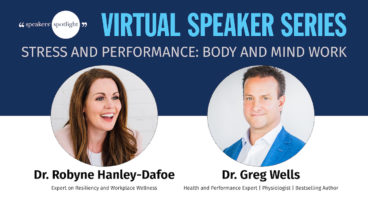Ahead of Mental Health Week, we turned to Dr. Lisa Belanger to share tips on how leaders can help prevent burnout within their teams. This week, Dr. Greg Wells shares tips on what we, as individuals, can do to recover from overwhelm and burnout, especially during challenging times.
Mental health has been the number one concern over the past couple of years. With constantly changing lockdowns and uncertainty, the pandemic has led to increased stress, anxiety, and feelings of overwhelm at levels that we haven’t seen before.
If we don’t give ourselves a chance to recover (both mentally and physically), says Greg — an expert on optimizing performance — this constant stress and pressure leads to burnout. There are small, simple steps we can take on a daily basis to stop this downward progression and help get us back to performing optimally and reaching our potential.
10 Tips for Overcoming Overwhelm and Burnout
These tips come from Greg’s new keynote presentation where he breaks down 10 science-based strategies to help audiences learn how to optimize health, well-being, and performance, even in challenging times.
Tip 1: The Birthday Candle Breath
Breathing is so effective at calming us down because the regions of the brain that control our breathing are linked to the regions of the brain that control our stress.
Taking a moment to pause and take a deep inhale and exhale is a great strategy anytime you’re feeling overwhelmed. There are many different breathing protocols, but an easy one to remember is just to pretend you’re blowing out candles on a birthday cake.
“When we take these long slow deep relaxing breaths, it enables us, via electrical activity inside the neurons in our brain, to calm the stress centre, and that helps us relax both mentally and physically,” Greg says.
Other breathing techniques include box breathing, used by special forces soldiers in combat, or Greg recommends using an app such as Othership or simply the Breathe app available on all Apple products.
Tip 2: Go for a Walk
We know how important exercise is for both physical and mental health, so going for a walk is a great strategy to try to decrease stress. However, any type of exercise is good for mental health so if you have limited mobility or are unable to go for a walk, any sort of movement that you can do to get your muscles moving and your blood flowing is beneficial.
“What happens when we exercise is that we actually contract our muscles, and when we contract our muscles we break down adrenaline and cortisol. These are two molecules or hormones that are released into our blood stream when we are stressed,” Greg says.
“They are incredible for instantaneous performance, they improve concentration, focus, physical energy,” he continues,” the problem is if they stay in your system for long periods of time, they damage your blood vessels and can cause various different types of disease.”
Tip 3: Listen to Music
There is a powerful link between music and mental health. Listening to music activates the emotional regions of the brain, meaning that we can use music to help us get into different moods — excited, energized, focused, joyful, relaxed, or calm. The next time you’re feeling overwhelmed, tense, or anxious, try listening to a calming soundtrack to lower your heart rate and de-stress.
“When we listen to music, seven regions in the brain increase their activity levels. These are the same seven regions of the brain that down regulate their activity levels in response to depression. We can use music to elevate our mood,” Greg says.
Tip 4: Get Outside
Getting outside is incredibly important for mental health and performance. And being in nature, such as a forest or other green space, is even more beneficial. Even walking to a nearby park for five minutes can help boost your mood.
“This doesn’t just positively affect our psychology, getting outside into nature also helps our physiology. What is known as ‘forest bathing’ increases the activity of immune cells in our body that fight off colds, flus, cancer, and COVID-19. These are called natural killer cells and they go around and destroy all the invaders. Natural killer cells work better in our bodies when we expose ourselves to nature at least once a week,” Greg says.
Tip 5: Call a Friend
“If there is one thing we have learned during this pandemic, in addition to the importance of health and well-being, is the power of community. We need each other, we need to connect, and we need connect in-person,” Greg says.
Lack of social connection over the past couple of years has had a huge toll on everyone’s mental health. Taking five minutes to call a friend or connect with someone in your life can drastically improve your mental health and is important now more than ever.
Research has shown that there is a direct link between our social relationships and our mortality, Greg says. The better our social relationships are lowers the risk of decreased mortality. It is more powerful than quitting smoking, cutting down alcohol consumption, doing cardiac rehab after a heart event, physical activity, the effect of obesity on our health, etc., he continued.
Tip 6: Try Meditation
Meditation, or other forms of mindfulness, helps us deactivate the sympathetic nervous system (the “fight or flight” response) and activate the parasympathetic nervous system (the “rest and digest” response). There are many different ways to meditate, but the basic idea is that you take 15, 10, or even 5 minutes out of your day to do nothing but relax and focus on the present moment.
“As little as three minutes of meditation a day has been shown to change the wiring and grow new networks inside the brain that strengthen our mental health and our mental performance as well,” Greg says.
There are several apps that can help get us started with Greg recommending Headspace, Calm, and Ten Percent.
Tip 7: Drink Some Water
Taking a moment to drink a glass of water not only gives us a nice pause from our hectic day, but it’s also incredibly important for our physical and mental performance.
“If you want more energy, mentally, physically, and emotionally, during the course of the day, please plan… to stay hydrated. It helps us have more energy to help us get through our days,” Greg says.
Tip 8: Give Yourself a Break
When we give ourselves permission to pause and take a break, we allow our bodies and minds to regenerate and recover.
“During this pandemic, with exhaustion, with overwhelm, with burnout, with fatigue, we are all feeling this lack of motivation, this lack of resilience,” Greg says.
The answer to all of the reasons we get tired are alleviated when we pause and take a breath, he continued. When we give ourselves a chance to recover and regenerate, our brain neurons replete and our immune system re-heals.
Tip 9: Anti-inflammatory Foods
Anti-inflammatory foods increase your ability to get nutrients to the tissues in your body that need them — including the brain.
Greg recommends that we focus on healthy carbohydrates and proteins, but also up our intake of anti-inflammatory foods because these help us regenerate. These include green tea, spices instead of sauces, dark chocolate, and berries.
Tip 10: Pause Before You Perform
Taking time to pause allows you to reach an optimal state before you perform. If you’re feeling stressed, anxious, or overwhelmed, taking time to pause gives your body and brain a reset so you can perform at your potential.
Tiny micro-wins like these throughout the day will make a huge difference to your mental health and over time will increase your ability to cope with stressors so you don’t reach the burnout stage again.
Dr. Greg Wells is a health and high performance expert. In his informative and engaging keynotes, he draws parallels between elite athletes and top executives to help business leaders and their teams perform at the highest level, even when under the most extreme circumstances.
Interested in learning more about Greg and what he can bring to your next event? Email us at [email protected].
This article was adapted from a blog originally posted on Greg’s website.




